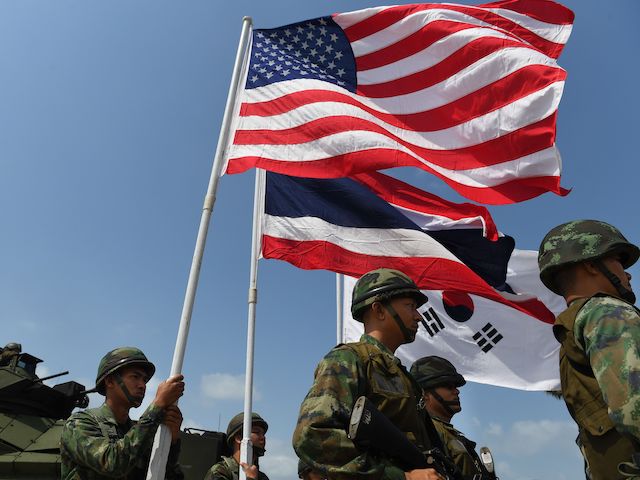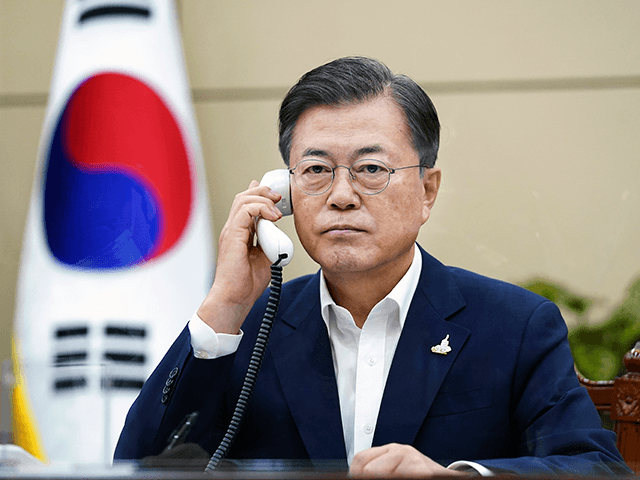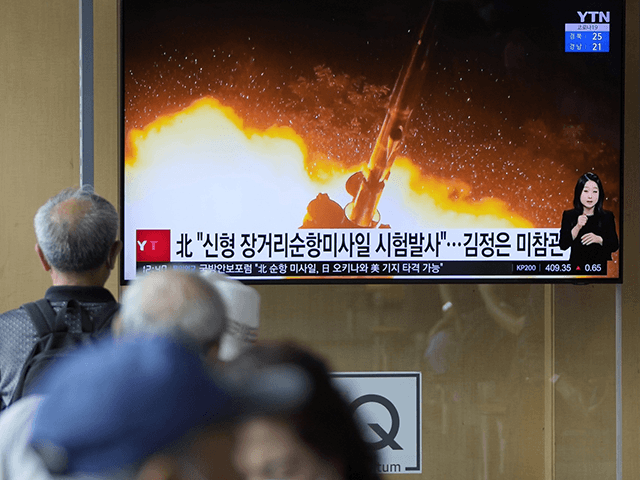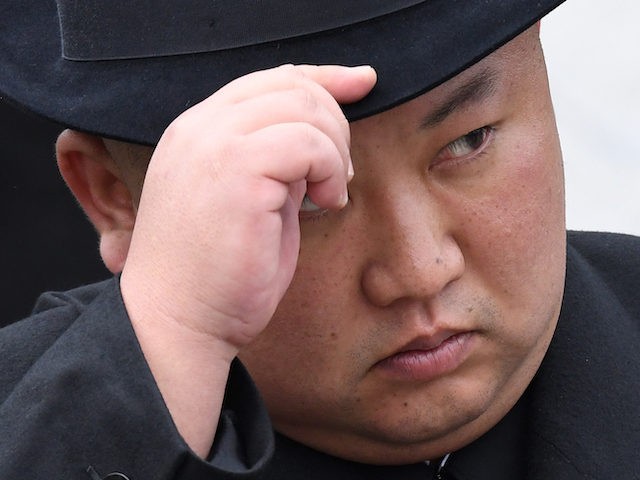North Korean dictator Kim Jong-un on Wednesday ordered the cross-border hotline to South Korea restored, indicating a willingness to resume peace negotiations with Seoul. However, Kim said he had no desire to speak with the “hostile” and “cunning” U.S. government.
“There is no change in the U.S. military threat to and hostile policy toward us at all, and instead, their expressions and methods get more cunning,” Kim said in an address to his rubber-stamp parliament, according to reports by North Korean state media.
“The U.S. is touting ‘diplomatic engagement’ and ‘dialogue without preconditions, but it is no more than a petty trick for deceiving the international community and hiding its hostile acts,” Kim ranted.
The dictator said he wanted to restore the hotline to South Korea, which his regime disconnected a year ago, save for a brief reconnection in July that was terminated when the U.S. and South Korea held military exercises denounced by the North.

US, Thai (C) and South Korean flags are flown during an amphibious landing in Chonburi on February 16, 2019, at the multi-nation Cobra Gold military exercises. (Lillian Suwanrumpha/AFP via Getty Images)
Kim said he was willing to talk to South Korea, provided it abandons its “delusions” about the threat posed by North Korea.
“We have neither aim nor reason to provoke South Korea and no idea to harm it,” Kim insisted.
The South Korean government responded to Kim’s speech by welcoming the offer to restore hotline communications but refraining from comment on his other remarks.
U.S. Special Envoy for North Korea Sung Kim said on Thursday the North’s provocative missile tests are an undeniable threat to its neighbors, but stressed the U.S. has “no hostile intent” toward Pyongyang and would like to see “tangible progress” on “the full range of bilateral and regional issues.”

In this photo provided by South Korea Presidential Blue House, South Korean President Moon Jae-in talks on the phone at the presidential Blue House in Seoul, South Korea, September 24, 2020. (South Korea Presidential Blue House via AP).
Reuters on Thursday quoted analysts who saw North Korea playing its old divide-and-conquer games, alternating between belligerent threats and claims to desire peace as it has so many times over the decades, but with a new dash of urgency because the administration of liberal South Korean President Moon Jae-in is coming to an end:
Analysts say the North’s carrot-and-stick approach is aimed at securing international recognition as a nuclear weapons state and dividing the United States and South Korea, taking advantage of President Moon Jae-in’s desire for a diplomatic legacy before his term ends in May.
“The North seems upset about the Biden administration having not made any concrete, tempting proposal to resume negotiations,” said Yang Moo-jin, a professor at the University of North Korean Studies in Seoul.
North Korea was also attempting to foster a more positive mood towards it in the South ahead of its presidential election and to press Moon to help shift the U.S. stance, he said.
The U.N. Security Council will hold a meeting on Friday to discuss North Korea’s missile launches. The meeting was scheduled at the request of the U.S., U.K., and France on Thursday, but delayed until Friday “at the request of Russia, China and other council members who said they needed more time to prepare,” according to the Associated Press (AP).

People watch a news program that was showing part of a North Korean handout photo that says, “North Korea’s long-range cruise missiles tests,” in Seoul, South Korea, September 13, 2021. (AP Photo/Lee Jin-man)
The AP noted that Kim’s speech on Thursday included some of the same slogans and phrases deployed by his sister Kim Yo-jong last week, a possible indication of her growing influence.
On Thursday, North Korean state media reported Kim Yo-jong has been promoted to a seat on the State Affairs Commission, the top decision-making body in the Communist dictatorship.
Her promotion was part of a major shake-up in the commission that saw nine of its members replaced, including North Korea’s top economic policymaker Pak Pong-ju and its top military commander Ri Pyong-chol. The latter was replaced by Gen. Pak Jong-chon, who oversaw this week’s test of what North Korea billed as its first hypersonic missile.

COMMENTS
Please let us know if you're having issues with commenting.